Related Research Articles

Iain Banks was a Scottish author, writing mainstream fiction as Iain Banks and science fiction as Iain M. Banks, adding the initial of his adopted middle name Menzies. After the success of The Wasp Factory (1984), he began to write full time. His first science fiction book, Consider Phlebas, appeared in 1987, marking the start of the Culture series. His books have been adapted for theatre, radio, and television. In 2008, The Times named Banks in their list of "The 50 greatest British writers since 1945".
Stephen Hunt is a Canadian writer known for his fantasy novels including the Jackelian series, which contains elements of steampunk and whose central setting is a nation resembling Victorian England, named the Kingdom of Jackals. Influences on his work include: Jack Williamson, Stephen Goldin, David Gemmell, Bruce Sterling, Larry Niven and Michael Moorcock.
Young adult fiction (YA) is fiction written for readers from 12 to 18 years of age. The term YA was first used regularly in the 1960s in the United States. The YA category includes most of the genres found in adult fiction, with themes that include friendship, sexuality, drugs and alcohol, and sexual and gender identity. Stories that focus on the challenges of youth may be categorized as problem novels or coming-of-age novels. The boundary between children's and adult literature is flexible, subject to moral and political ideology, and in some cases meaningless.

Fergal Patrick Keane is an Irish foreign correspondent with BBC News, and an author. For some time, Keane was the BBC's correspondent in South Africa. He is a nephew of the Irish playwright, novelist and essayist John B. Keane.
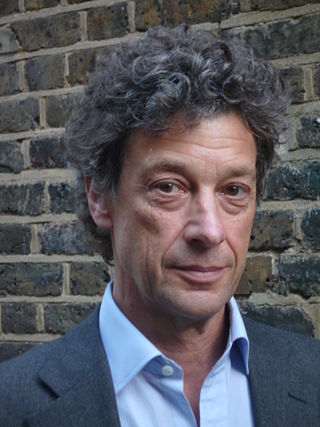
Adam Zamoyski is a British historian and author.

Ann Patchett is an American author. She received the 2002 PEN/Faulkner Award and the Orange Prize for Fiction in the same year, for her novel Bel Canto. Patchett's other novels include The Patron Saint of Liars (1992), Taft (1994), The Magician's Assistant (1997), Run (2007), State of Wonder (2011), Commonwealth (2016), The Dutch House (2019), and Tom Lake (2023). The Dutch House was a finalist for the 2020 Pulitzer Prize for Fiction.
Simon Ings is an English novelist and science writer living in London. He was born in July 1965 in Horndean and educated at Churcher's College, Petersfield and at King's College London and Birkbeck College, London.
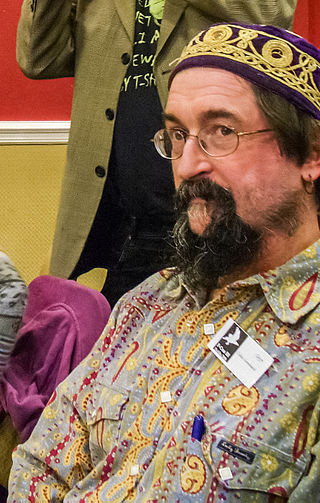
Colin Greenland is a British science fiction writer, whose first story won the second prize in a 1982 Faber & Faber competition. His best-known novel is Take Back Plenty (1990), winner of both major British science fiction awards, the 1990 British SF Association award and the 1991 Arthur C. Clarke Award, as well as being a nominee for the 1992 Philip K. Dick Award for the best original paperback published that year in the United States.

Sir Michael Andrew Bridge Morpurgo is an English book author, poet, playwright, and librettist who is known best for children's novels such as War Horse (1982). His work is noted for its "magical storytelling", for recurring themes such as the triumph of an outsider or survival, for characters' relationships with nature, and for vivid settings such as the Cornish coast or World War I. Morpurgo became the third Children's Laureate, from 2003 to 2005, and he is also the current President of BookTrust, the UK's largest children's reading charity.

Robert Paul Holdstock was an English novelist and author best known for his works of Celtic, Nordic, Gothic and Pictish fantasy literature, predominantly in the fantasy subgenre of mythic fiction.

The Ordeal of Gilbert Pinfold is a novel by the British writer Evelyn Waugh, first published in July 1957. It is Waugh's penultimate full-length work of fiction, which the author called his "mad book"—a largely autobiographical account of a period of hallucinations caused by bromide intoxication that he experienced in the early months of 1954, recounted through his protagonist Gilbert Pinfold.

The Eye of the Heron is a 1978 science fiction novel by American author Ursula K. Le Guin which was first published in the science fiction anthology Millennial Women.
Laurie Graham is a journalist, radio scriptwriter and novelist. She lives in London.
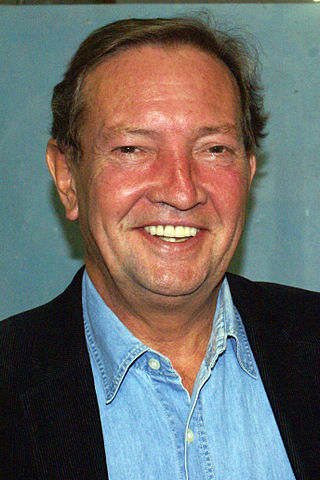
Martin Walker is the author of the popular Bruno detective series. After working at The Guardian from 1971 to 1999, Walker joined United Press International (UPI) in 2000 as an international correspondent in Washington, D.C., and is now editor-in-chief emeritus of UPI. He was a member of A.T. Kearney's Global Business Policy Council.
Alma Luz Villanueva is an American poet, short story writer, and novelist.
Daisy Louisa Dominica Waugh is an English novelist and journalist.
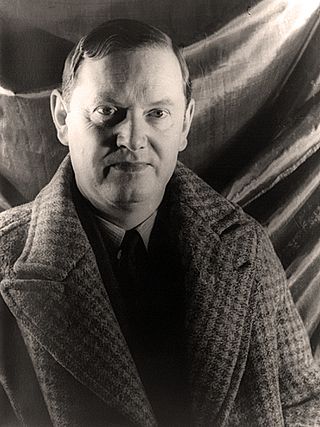
The Temple at Thatch was an unpublished novel by the British author Evelyn Waugh, his first adult attempt at full-length fiction. He began writing it in 1924 at the end of his final year as an undergraduate at Hertford College, Oxford, and continued to work on it intermittently in the following 12 months. After his friend Harold Acton commented unfavourably on the draft in June 1925, Waugh burned the manuscript. In a fit of despondency from this and other personal disappointments he began a suicide attempt before experiencing what he termed "a sharp return to good sense".
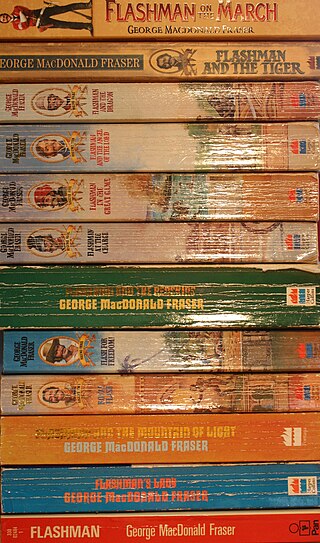
The Flashman Papers is a series of novels and short stories written by George MacDonald Fraser, the first of which was published in 1969. The books centre on the exploits of the fictional protagonist Harry Flashman. He is a cowardly British soldier, rake and cad who is placed in a series of real historical incidents between 1839 and 1894. While the incidents and much of the detail in the novels have a factual background, Flashman's actions in the stories are either fictional, or Fraser uses the actions of unidentified individuals and assigns them to Flashman. Flashman is a character in the 1857 novel by Thomas Hughes, Tom Brown's School Days; Hughes' version of the character is a bully at Rugby School who is expelled for drunkenness. The character was then developed by Fraser, and appeared in the 1969 novel Flashman. Fraser went on to write a total of eleven novels and one collection of short stories featuring the character.
Joan Mary Gale Robinson was a British author and illustrator of children's books.
Joe Heap is an English author who resides in London. His poetry has been published in several journals and he was a winner of the 2004 Foyle Young Poet Award. He was a guest author at the 2018 Edinburgh International Book Festival.
References
- ↑ "Four Days in June". Authors G – Iain Gale. FantasticFiction.
- ↑ "Iain Gale". Author Profile. HarperCollins. Archived from the original on 20 March 2012.
- ↑ "Iain Gale". Fantastic Fiction. Retrieved 11 May 2013.